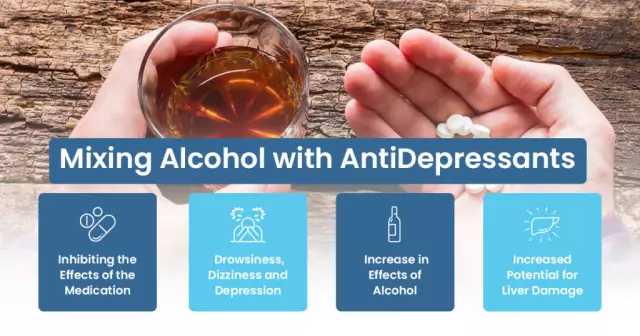- Author Rachel Wainwright wainwright@abchealthonline.com.
- Public 2023-12-15 07:39.
- Last modified 2025-11-02 20:14.
Should you be afraid of sexual abstinence: 6 myths about sperm toxicosis
The fact that prolonged sexual abstinence in a certain way affects the behavior of men has long been known. Ancient Greek doctors believed that in such a situation the body is intoxicated with excess sperm. It was they who introduced the term "spermotoxicosis", the literal translation of which is "poisonous seed" (from the Greek σπερμα - seed and τοξικός - poisonous).
Over time, scientists have established that no poisoning of the body with semen or unused eggs (if a woman is deprived of sexual intercourse) does not occur. However, some still believe that sperm toxicosis exists. We decided to dispel the misconceptions associated with the danger of sexual abstinence.

Source: depositphotos.com
Abstinence undermines health
In fact, much suggests otherwise. It is enough that giving up sex significantly reduces the risk of infection with sexually transmitted diseases. For a person who has been deprived of sex for a long time, the likelihood of ingestion of the causative agents of syphilis, gonorrhea, HIV or hepatitis B is very low (in fact, he can only become infected through blood transfusions).
Nevertheless, prolonged sexual abstinence can adversely affect hormonal levels, which largely determine the state of the nervous system and human behavior. In men, this is often manifested by excessive aggressiveness or a tendency to moralizing, and in women - by sudden mood swings, quarrelsomeness or depression. However, such a delicate mechanism as the endocrine system reacts to the absence of sex individually.
In addition, the social factor strongly affects the behavior of people who have been deprived of sexual intercourse for a long time. Men, who are usually proud of their sexual success, are especially sensitive to failures in this area, fearing to become objects of increased attention and even ridicule of others. A sexually dissatisfied woman suffers from low self-esteem and considers herself to be deprived of the attention of the opposite sex. All this is far from the best reflected on the quality of life, but it is still not necessary to talk about the direct harm that sexual abstinence supposedly causes health.
Spermotoxicosis is a common and dangerous disease
It is often believed that the toxic effect on the body is exerted not so much by unused germ cells as by the products of their decay. It's a delusion. Sperm and egg cells are composed of the same substances as the cells of other tissues. Sex cells go through the same maturation process and there is a due date for them. Then those of them that did not manage to participate in the birth of a new life are destroyed. Decay products are excreted from the body.
There is simple and obvious evidence that pathological conditions caused by lack of sexual intercourse do not exist. Otherwise, all people who are forced to do without sex for a long time would certainly suffer from them (for example, the military or ministers of religious cults who take a lifelong vow of celibacy).
Abstinence Leads to Perversion
Paraphilias (socially unacceptable sex drives) are caused by pathological abnormalities in the psyche; there is no evidence of their association with sexual abstinence. Scientists have not yet established the exact cause of such perversions as pedophilia or bestiality, but presumably it lies in negative impressions received in early childhood, and not in circumstances conducive to sexual dissatisfaction in an adult.
Masturbation is unhealthy
In medieval Europe, masturbation was considered a serious sin. This idea was widespread, it was propagated and supported by the church. Apparently, it was on this basis that the modern misconception arose that people who have a habit of self-satisfaction destroy their health.
In reality, masturbation does not harm the body. According to modern concepts, this is just one type of sexual activity. It is worth noting that masturbation is not at all the lot of exclusively lonely and sexually dissatisfied people. As a supplement to normal contacts, it is successfully practiced by happy married couples.
Early onset of sexual activity is the norm
The root of this misconception is in the recognition of the correctness of the family structure, which existed in many countries in the pre-industrial period. In those days, people tried to create married couples (and engage in sexual relations) at a very young age in order to provide families with new workers as soon as possible. This practice was also dictated by factors such as a short life span and high infant mortality.
For a modern person, early onset of sexual activity is not necessary. Being a virgin at 18-20 is not a shame today. On the contrary, this often indicates a variety of life goals and interests, a rich inner world and the presence of high demands on yourself and your future partner.
Abstinence helps to achieve athletic success
This opinion was held by sports doctors for a long time, but the studies carried out showed its inconsistency. For high sporting achievements, sacrifices of this kind are not at all necessary. Sex in reasonable quantities not only does not weaken a person, but also increases the overall tone of the body, improves mood and creates self-confidence. Today, no one requires athletes to abstain from sexual intercourse, including before competitions.
The human body is very intelligent and economical. If some of its functions are in little demand, it is less provided with biological material than all the others. This is exactly what happens to a man who is temporarily deprived of sexual intercourse: his body begins to reduce sperm production. The process is neither pathological nor irreversible: with the normalization of sexual activity, the volume of semen is restored.
Despite the fact that sperm toxicosis does not exist, some representatives of the stronger sex still believe that abstinence is harmful to their health. It is simple to verify the opposite: you need to do a spermogram, biochemical analysis of sperm and a MAR test (to determine the number of non-working sperm). The doctor will evaluate the research results and give an opinion on the state of the reproductive system. If you have problems, you may need the help of an andrologist or urologist. In some cases, it will not be superfluous to consult a psychologist: the normalization of sexual activity is a complex process, and the problems associated with it can sometimes be solved only by the joint efforts of several specialists with the active assistance of the patient himself.
YouTube video related to the article:

Maria Kulkes Medical journalist About the author
Education: First Moscow State Medical University named after I. M. Sechenov, specialty "General Medicine".
Found a mistake in the text? Select it and press Ctrl + Enter.






